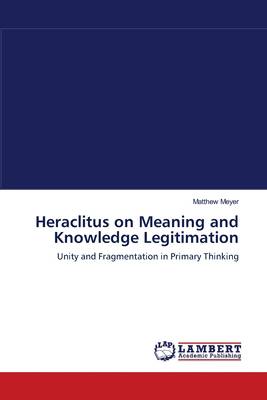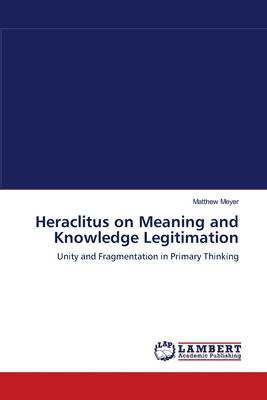
Bedankt voor het vertrouwen het afgelopen jaar! Om jou te bedanken bieden we GRATIS verzending (in België) aan op alles gedurende de hele maand januari.
- Afhalen na 1 uur in een winkel met voorraad
- In januari gratis thuislevering in België
- Ruim aanbod met 7 miljoen producten
Bedankt voor het vertrouwen het afgelopen jaar! Om jou te bedanken bieden we GRATIS verzending (in België) aan op alles gedurende de hele maand januari.
- Afhalen na 1 uur in een winkel met voorraad
- In januari gratis thuislevering in België
- Ruim aanbod met 7 miljoen producten
Zoeken
Heraclitus on Meaning and Knowledge Legitimation
Unity and Fragmentation in Primary Thinking
Matthew Meyer
Paperback | Engels
€ 70,45
+ 140 punten
Omschrijving
This book offers a new account of the context in which Heraclitus develops his views on meaning and knowledge. The frame of mythic thinking affords insight into important dimensions of Heraclitus's thought, particularly the simultaneous holism and fragmentation that characterized his ideas on the world and on wisdom. Heraclitus's idea of shared thinking captures the holistic-fragmented nature of the social bond perfectly. A close reading of his thought suggests we should not take the continuity of thought as passive or stable. Thus, we discover that the signature Heraclitean concept of the agon (conflict) is present in the fragments that describe shared thinking. The fragments cannot be exhausted of meaning because they capture the very essence of meaning, fragmentation, within. In sum, Heraclitus seems to suggest that philosophy should not wish away conflict and competition in its definitions of the world, but see conflict as the basis of any world it might hope to define.
Specificaties
Betrokkenen
- Auteur(s):
- Uitgeverij:
Inhoud
- Aantal bladzijden:
- 144
- Taal:
- Engels
Eigenschappen
- Productcode (EAN):
- 9783838304731
- Verschijningsdatum:
- 29/06/2009
- Uitvoering:
- Paperback
- Afmetingen:
- 150 mm x 220 mm
- Gewicht:
- 233 g

Alleen bij Standaard Boekhandel
+ 140 punten op je klantenkaart van Standaard Boekhandel
Beoordelingen
We publiceren alleen reviews die voldoen aan de voorwaarden voor reviews. Bekijk onze voorwaarden voor reviews.









